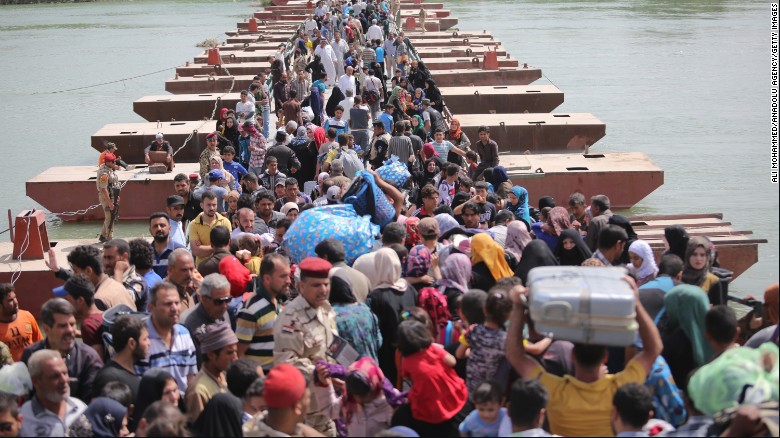In July, the Washington Post reported that federal prosecutors were preparing charges against Umm Sayyaf. The Post also noted that "[a] prosecution of Umm Sayyaf for her suspected role in taking Mueller hostage would be the first publicly known FBI case involving an alleged senior figure in the Islamic State." Reports indicate that the decision to transfer her to Iraq's Kurdish regional government, rather than bring her back to the United States to face charges, stemmed in part from the fact that Iraq does not extradite its citizens.
 |
| U.S. Secretary of Defense Ash Carter speaks to reporters about the operation that led to Umm Sayyaf's capture (Source: WSJ) |
This begs the question: what is the current status of U.S.-Iraqi extradition agreements? This is not merely an academic question. If the United States continues to conduct military operations against ISIS forces within Iraqi territory, will it be unable to bring ISIS terrorists to trial in the United States? Once a prisoner is in the U.S., the U.S. has tools at its disposal to try him or her for material support of terrorism. Specifically, 18 U.S. Code 2339A and 2339B criminalize the material support of terrorists and terrorist organizations. Though not heavily publicized, the FBI and U.S. Attorney's Offices have been making domestic arrests for material support of terrorism -- often when an individual is at the airport on his way to Syria to join ISIS. Moreover, the U.S. has jurisdiction over conduct violative of its "material support" statutes even when that conduct occurs outside of the geographic bounds of the United States. For example, 2339B contains an entire "Extraterritorial Jurisdiction" section that states there is jurisdiction for a material support of terrorist organizations offense if "after the conduct required for the offense occurs an offender is brought into or found in the United States, even if the conduct required for the offense occurs outside the United States." Thus, were Umm Sayyaf or another high-profile ISIS member captured and brought into the United States, the appropriate U.S. Attorney's Office could charge and prosecute said ISIS member.
In order to get said ISIS member to the U.S., however, one might have to deal with the issue raised by the Iraqis in the present case: extradition. The United States in fact has a still-existing extradition treaty with Iraq that dates back to 1936. That treaty lays out the charges and procedures under which either party can request extradition of an individual located within the geographic bounds of the other party. Reviewing the treaty, terrorism is not mentioned but "murder" and "kidnapping" are charges in which Umm Sayyaf may have been a participant and therefore potentially charged in the United States. One hurdle, however: Article VIII of the treaty notes that "neither of the High Contracting Parties shall be bound to deliver up its own citizens." Therefore, Iraq would not be bound to turn over an Iraqi citizen to face charges in the U.S., but nothing in the treaty prohibits Iraq from voluntarily doing so. The treaty was used most recently in 2014, when Iraq extradited a U.S. citizen back to the U.S. to face fraud charges related to defense contracting.
However, there is another, newer hurdle to extradition: the Iraqi Constitution. Article 21 of the Constitution of Iraq states that "[n]o Iraqi shall be surrendered to foreign entities and authorities." This is a much more explicit prohibition that the more discretionary language of the 1936 extradition treaty. As the U.S. continues to wage military operations against ISIS, one must wonder if the Umm Sayyaf incident has led American and Iraqi military and political personnel to discuss creative ways to comply with the Iraqi Constitution and also bring ISIS detainees to the United States. What if, for example, a high-level ISIS commander known to have been involved in killing American citizens is captured by U.S. military personnel? At some point, the American government would justifiably want to see certain ISIS detainees brought to the U.S. to face trial. Indeed, the decision to hand Umm Sayyaf over to the Kurdish regional government rather than the central government may have reflected a reluctance to turn her over to the central Iraqi government (of course, it could have also been a strategic decision to avoid placing the Shiite government in charge of an important ISIS detainee).
One possible solution would be to establish clear U.S. custody of a detainee from the moment of capture. If the Arabic version of the Iraqi Constitution is interpreted the same as the English version, that constitution prohibits the surrendering of Iraqi citizens to foreign authorities. If Iraq never has custody over a detainee, the thinking would go, there would be no constitutional violation because Iraqi authorities never had custody of the detainee. This is one way in which both governments could work together to help respect the integrity of the Iraqi Constitution while also aggressively pursuing ISIS terrorists.



